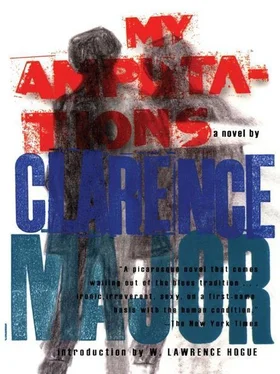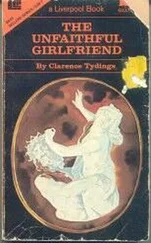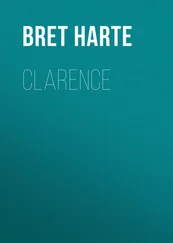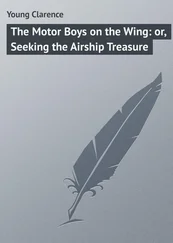Clarence Major - My Amputations
Здесь есть возможность читать онлайн «Clarence Major - My Amputations» весь текст электронной книги совершенно бесплатно (целиком полную версию без сокращений). В некоторых случаях можно слушать аудио, скачать через торрент в формате fb2 и присутствует краткое содержание. Год выпуска: 2008, Издательство: Fiction Collective 2, Жанр: Современная проза, на английском языке. Описание произведения, (предисловие) а так же отзывы посетителей доступны на портале библиотеки ЛибКат.
- Название:My Amputations
- Автор:
- Издательство:Fiction Collective 2
- Жанр:
- Год:2008
- ISBN:нет данных
- Рейтинг книги:5 / 5. Голосов: 1
-
Избранное:Добавить в избранное
- Отзывы:
-
Ваша оценка:
- 100
- 1
- 2
- 3
- 4
- 5
My Amputations: краткое содержание, описание и аннотация
Предлагаем к чтению аннотацию, описание, краткое содержание или предисловие (зависит от того, что написал сам автор книги «My Amputations»). Если вы не нашли необходимую информацию о книге — напишите в комментариях, мы постараемся отыскать её.
My Amputations — читать онлайн бесплатно полную книгу (весь текст) целиком
Ниже представлен текст книги, разбитый по страницам. Система сохранения места последней прочитанной страницы, позволяет с удобством читать онлайн бесплатно книгу «My Amputations», без необходимости каждый раз заново искать на чём Вы остановились. Поставьте закладку, и сможете в любой момент перейти на страницу, на которой закончили чтение.
Интервал:
Закладка:
A gas bomb, they said, started the fire in Misterbianco. Just for the ride, Mason went out in the jeep with Vito, a shy man in a red plastic jacket. Vito was a new inspector for the Catania fire department. “Go see the flames,” Carlina had said, tossing her dark shoulder-length hair back from her left eye and giving Mason one of those serious-blank Modigliani looks. On the way to Misterbianco Vito said it had to be the work of either a crazy arsonist or a revolutionary. It'd started at the Guglielmo Vanvitelli, a food processing plant, and, according to the voice on the phone from Misterbianco (where there was no fire department), the nearby hillside, trees and grass were burning away rapidly. Vito'd called for help from coastal Contana Rossa and Paterno, slightly inland to the north. As they approached, Mason saw the smoke drawing the village of Livorno as it looked on July 12, 1884, against a red chalk and terra verde sky. “Holy Galileo!” Vito slapped his own cheek. The yellow-orange flames were leaping furiously up the hill, higher than the cypresses, leaving a blue-gray ash in their wake, Mason and Vito jumped down from the jeep before it stopped moving. An old rusty fire-truck with Paterno painted clumsily on its left door was parked about fifty feet from the food plant. Several men, working one hose, were fighting the flames and smoke there but nothing was being done about the spreading. Beyond the cypresses was an orange grove. It would be next — and soon. Mason looked into Vito's excited eyes. “What'd you do now? ” Vito didn't answer: he ran back to the jeep and snatched his telephone and began shouting in Italian into it. Mason wished he was on the Titanic, going down slowly. Rowing a mean boat. Or how about being at the Battle of the Amazons. Or at the Resurrection or at the Descent from the Cross. Where one was counted, every moment. Maybe being the Snake in the Apple Tree was a good role. But here? Watching a fire. Well, there was always Mardi Gras. He watched a woman with a Medusa face running from the plant toward Vito. Then beyond her, he noticed for the first time about fifty workers, mostly women, on the northeast side of the building, watching it burn. One man in the crowd seemed to be playing blind man's bluff. Suddenly a horse appeared on the burning hillside, stopped, gave the fire a skeptical look, then ran off — toward Mason. Something wild in Mason turned him into a seventeenth-century general as he leaped upon the galloping thick-footed Calabrese. It was white with black spots. Mason held on by its mane and gave the right pressure (with his thighs) to slow its pace. Luckily, it wasn't a wild trotter breaking out of some sepia and wash landscape. Its lines were as graceful as Venetian quill strokes. Vito was shouting and gesturing to Mason as the horse reared. Medusa too was shouting at Mason. Several people from the crowd came running down to the jeep. The horse kept trying to dislodge its rider by rearing and dancing around in the plush blue grass. Two police cars and two more fire trucks arrived just as four thick-set Venetian horses, straight out of the Iron Age, appeared on the same hillside where Calabrese first paused to inspect the heat. Everybody now, except the fire fighters, had come down from the food plant. They were watching Mason's effort to hold his own: some cheered him on, others angrily shook their fists at him. One man, who looked like Pope Gregory III, tried to catch the horse by its neck. Another yanked at Mason's right leg till his shoe came off. This one had a Caligula-look. As the cops approached with drawn pistols, Mason fell from his perch into a soggy spot in the grass. Did he think he was a figure in Beckmann's Carnival triptych: in solemn pursuit of a sexual posture? Vito helped him up. So did two policemen. In Italian, the one with the frog-head asked for his identity paper. Meanwhile, Calabrese ran off to join the Venetians. As Mason brushed at the wet seat of his jeans, he glanced over his shoulder in time to see Calabrese lead the Venetians down the other side of the hill, like paper figures dropping into a manila envelope. They side-stepped the fire with the heavy grace of Degas ballet dancers dislocated in Bartolomeo's Assumption of the Virgin . Mason handed frog his passport. “Come si chiama?” frog asked as he flipped the pages of the passport. His companion, meanwhile, was speaking to Vito: “Chi è quest'uomo?” Then Vito explained in Italian that Mason was a writer visiting the university in Catania. Yet, in minutes, despite Vito's protest, the officers had Mason in handcuffs. They gagged him and tied his legs together, too. He struggled like a Tintoretto figure. The crowd had become a mob. Fist fights broke out. The firemen continued to fight the flames. One, under orders from the police, turned the hose on the crowd. Mason was thrown in the back seat of a police car. The horse returned, running through the burned grass, up past the food plant. Something with huge wings flew overhead, causing a momentary shadow to cover the chaos. Mason spat phlegm on the seat. His nose rested on a spot that smelled of semen and sweat. As he was driven away, he heard Vito shouting after the car. One cop sat in back with Mason. In the front, Mason was aware of a woman's voice and the voice of the cop driving. The woman was called Priscilla. The cop beside Mason said, “Da dove viene?” When they arrived at the police station in Catania, the cops went for an officer who spoke English. He was plump with pendulous breasts. He seemed happy as he spoke this distant tongue: “… you will be charged with arson,” he told Mason. Priscilla'd come into the station with them. She got slapped on the ass several times by cops just passing the reception desk where Mason stood still in handcuffs. His legs now though were free. He wished he were back in 1920, in bed with Jeanne Hébuterne, soothing her, giving her a reason to live. Mason's rage was met with a slap across the face. He kept telling them they had the wrong man. Breasts laughed at him as the officer at the reception desk, with Mason's passport spread before him, booked the Afro-American for arson. How much injustice could one endure. Moments later, Mason was pushed into an interrogation room. Bats hung upside-down from the ceiling. A couple of men in armor hung out in one corner playing cards. A portrait of Mario Buggelli was tacked to the wall alongside a reprint of Beata Matrex. Mason almost wept on sight of it: what lovely African lust lingered beneath its intentions! He was forced down into a hard wooden chair. Four or five cops surrounded him. Breasts held Mason's bearded chin in the palm of his hand. Then he spat in his face. Mason blinked: while his eyes were closed he saw Abraham travelling toward the Promised Land. Then the door behind him opened and somebody said the name Vito Momachino. His wife, the professor, they said, was with him.
Professor Rosa Bartoli had reserved a room for him at the Argentina in Florence. Why'd he felt so safe lately? was it possible The Impostor was no where. Mason drove north, pushing his luck, enjoying winter warmth. The nefarious trickster arrived at suppertime. In the lobby the TV showed a cartoon of a woman belly-dancing and doing a strip. Tease? She wasn't fooling! She ended her act with only her reflexes X-rayed. Hanging from the construction site of her body was a placard with this message: “… Egli la aspetta.” He felt yucky hungry horny and free — no lecture till Monday and it was only Friday. Determined not to fall for any rigmarole of false clues, a hateful vendetta of his own mind, he was a masoned wall of faith. Self-confidence was his middle name. No pun. Concreteness could be seen all over historic Florence, as he walked. He looked into the facade of the city: workers in stone had made it a towering monument to something he reluctantly understood. Well, even he was beginning to realize the real subject of his story wasn't this damned quest he'd thought he was on. He stuttered angrily realizing it: “I'll b-b-be d-d-damned!” He pulled out a Camel and struck a match to it. Wasn't he really playing the ultimate pinball machine of luck and trying (even with a false name) to be himself. Don't answer that. A true freemason? or just an ex-apple cart urchin adrift in a string-of-lucky breaks. He slept then got up and went out: daylight was a silicon blessing. Was Eye really watching him? or was it just his paranoia? Free as he felt he still felt trapped. Yet he went forth: into the chapels churches cloisters galleries fortresses gardens and like a good winter wanderer, scanned the squares — crossed and recrossed Ponte Vecchio finding the people more interesting than the whatnots the tourist-trap jewelry the sexy manikins. Lotta girls with slender brown legs. After doing the Uffizi he went to Dante's house: went down on his hopeless knees before it and burned a candle for five minutes. Passersby thought him a fool. He felt like he was fucking in public. Relentlessly he explored the Medici Chapel, seeing the way Michelangelo left the marble to speak of itself as marble, and moved on to Piazza della Signori. Museum floors were hard. Inside Museo Nazionale the dreamer of bird-seeds became aware of the hugeness of his new hunger (seemingly endless, right). He'd already focused one slanted eye on a ristorante boasting tripe in the Florentine manner. As he made a scientific investigation of the menu, a kid snatched a purse from an old woman and split on his bike. Mason whispered to himself, you are not a moralist. As he wandered he vaguely thought about Monday: his lecture wouldn't be just another narcissistic rug-cutting act. Then he got his tripe: in a tomato sauce: it was good. The seven-headed, fire-breathing dragon that now faced Mason did not promise to be just or moral. It was midnight and somehow he hadn't gotten very far: hadn't he been trying to cross Piazza Saint Giovanni since noon? Had time caved in on him? Sunlight at one point — now a full moon. Some impious rite of… “The horror! The horror!” Had he been going around in circles since mid-day. Hadn't Bartoli been with him. The taste of sparkling silverware and the soave they'd drunk at lunch was still in his mouth. The Duomo sat there like a giant toad with semidivine intentions. Sentimental boys and girls giggled in the shadows of its facade. What'd set him off? Bartoli's question: “Are you for real? ” American words crowded with fresco-saints in silver and gold! As the beast roared, the kids went on with their mockery of his disorientation. Or were they laughing at the past: at, say, daisies in chalcedony or precious stones around the neck of one of the Medici women. Mason stumbled about the piazza, unable to decide which way to go. Too many variables! Too many directions! And, jokingly, hadn't he admitted to Rosa Bartoli, “Yes, you're right, I'm not the person I claim to be,” but wasn't it clear in his face that he was putting her on. He was talking to himself now: “She gained my confidence then betrayed me: promised not to tell any body: yet she went off, leaving me blind drunk — or stoned? — to reveal my secret to the world. Curse her! Aliosha! I was once a boy who believed in everybody! I trusted. I had confidence!” The kids snickered. Mason swung his fist at the moon. He howled and barked, then fell to his knees, slobbering. No dignity? Everything that rises will converge. The winds blew. One could always fly home! Or die, after an uneventful, passive, stupid life! Okay. So, he'd gone along with Rosa. He'd played the game. A lunch game: “Yes, you're right: I'm not who you think I am. I'm the Hunter Gracchus. I'm… I'm lost! ”
Читать дальшеИнтервал:
Закладка:
Похожие книги на «My Amputations»
Представляем Вашему вниманию похожие книги на «My Amputations» списком для выбора. Мы отобрали схожую по названию и смыслу литературу в надежде предоставить читателям больше вариантов отыскать новые, интересные, ещё непрочитанные произведения.
Обсуждение, отзывы о книге «My Amputations» и просто собственные мнения читателей. Оставьте ваши комментарии, напишите, что Вы думаете о произведении, его смысле или главных героях. Укажите что конкретно понравилось, а что нет, и почему Вы так считаете.












